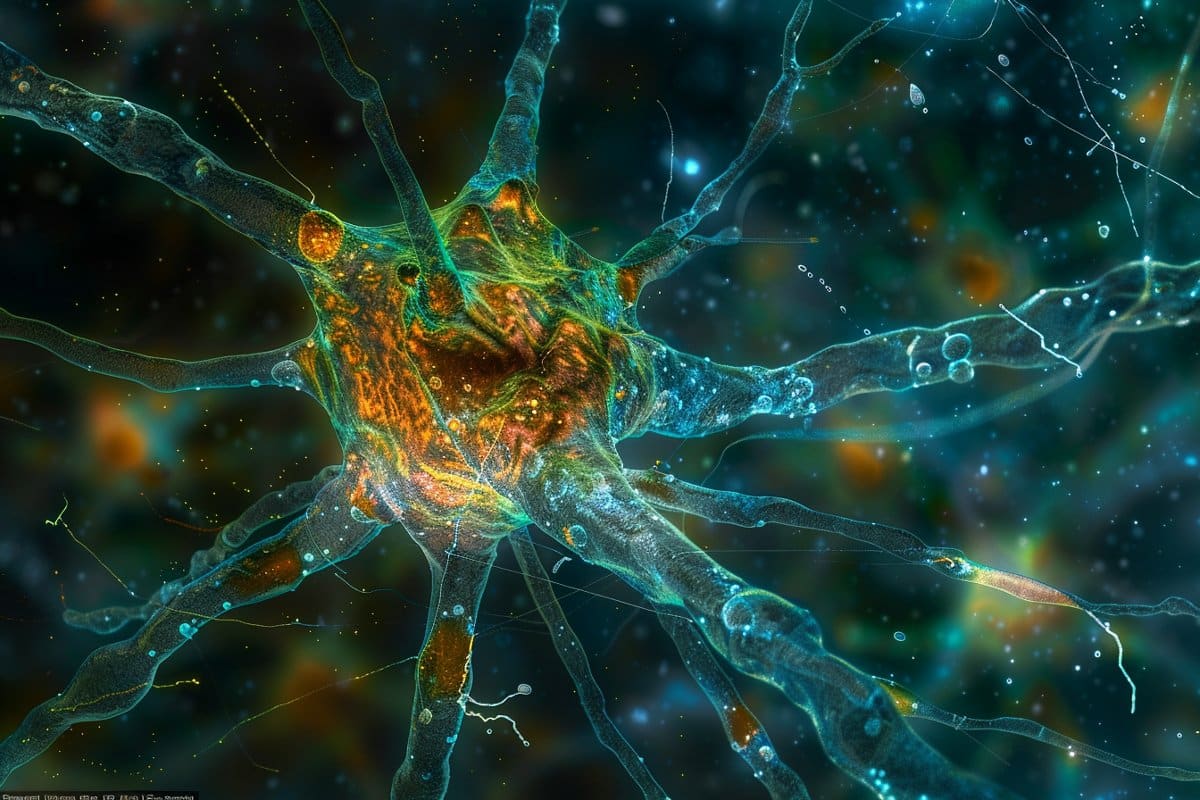Summary: Astrocytes, traditionally non-immune cells within the central nervous system, possess the ability to develop an immune memory, responding more vigorously to subsequent immune challenges. This groundbreaking study reveals that through an epigenetic mechanism involving the enzymes p300 and ATP-citrate lyase (ACLY), astrocytes enhance their pro-inflammatory responses, a trait similar to the immune memory seen in adaptive immunity.
The findings, which have been observed in both mouse models of multiple sclerosis (MS) and human cell samples, suggest that astrocyte immune memory may play a significant role in chronic neurological disorders, offering new insights into disease pathology and potential therapeutic targets to mitigate CNS inflammation.
Key Facts:
- Astrocytes Exhibit Immune Memory: Astrocytes can acquire and recall previous encounters with immune stimuli, developing faster and stronger inflammatory responses upon re-exposure.
- Epigenetic Mechanism Identified: The formation of astrocyte immune memory is driven by the enzymes p300 and ACLY, crucial for enhancing gene activity related to inflammation.
- Implications for Chronic Neurological Disorders: Elevated levels of ACLY+p300+ astrocytes in MS patients suggest a link between astrocyte immune memory and chronic CNS diseases, highlighting a potential target for reducing inflammation.
Source: Brigham and Women’s Hospital
Immunological memory — the ability to respond to a previously encountered antigen, or foreign substance, with greater speed and intensity on re-exposure is a hallmark of adaptive immunity.
Innate immune cells also develop metabolic and epigenetic memories that boost their responses, but it was previously unknown if non-immune cells like astrocytes, which interact with immune cells and contribute to inflammation in the central nervous system (CNS), acquire aspects of immune memory of encountering immune stimuli.

Investigators at Brigham and Women’s Hospital, a founding member of the Mass General Brigham healthcare system, have demonstrated for the first time that astrocytes, non-immune cells, can acquire a memory of their previous interactions with the immune system, with important implications for our understanding of tissue inflammation.
The study found that astrocytes can remember previous interactions with immune cells, acquire developing faster and stronger pro-inflammatory responses upon subsequent re-challenge with immune stimuli.
These findings resemble classic descriptions of immune memory in immune cells, hence the investigators have termed it astrocyte immune memory, to differentiate it from described roles of astrocytes in cognitive memory.
Considering the longevity of astrocytes, and their multiple contributions to CNS pathology, the authors suggest that astrocyte immune memory might be a possible mechanism behind chronic neurologic disorders.
In a series of in vivo and in vitro studies, the investigators established that astrocyte immune memory is driven by an epigenetic program driven by p300 and ATP-citrate lyase (ACLY) — enzymes that help increase gene activity.
The team found that astrocytes expressing p300 and ACLY were upregulated in mouse models of multiple sclerosis (MS), and that astrocyte-specific inactivation of these genes suppressed CNS inflammation and disease progression.
The researchers also observed astrocyte memory in vitro in human cells and detected elevated levels of ACLY+p300+astrocytes in chronic MS human patient samples, indicating a potential role of astrocyte memory in disease pathology.
“Our work reveals that astrocytes, non-immune cells, can develop aspects of immune memory,” said corresponding author Francisco Quintana, PhD, of the Department of Neurology.
“We also show that epigenetic astrocyte memory promotes CNS pathology in autoimmune inflammation. These findings highlight important mechanisms relevant to neurologic disorders like MS and could guide the development of novel therapeutic interventions that target ACLY+p300+ memory astrocytes to reduce inflammation.”
About this neuroscience research news
Author: Jessica Pastore
Source: Brigham and Women’s Hospital
Contact: Jessica Pastore – Brigham and Women’s Hospital
Image: The image is credited to Neuroscience News
Original Research: Closed access.
“Disease-associated astrocyte epigenetic memory promotes CNS pathology” by Francisco Quintana et al. Nature
Abstract
Disease-associated astrocyte epigenetic memory promotes CNS pathology
Disease-associated astrocyte subsets contribute to the pathology of neurologic diseases, including multiple sclerosis and experimental autoimmune encephalomyelitis (EAE), an experimental model for multiple sclerosis. However, little is known about the stability of these astrocyte subsets and their ability to integrate past stimulation events.
Here we report the identification of an epigenetically controlled memory astrocyte subset that exhibits exacerbated pro-inflammatory responses upon rechallenge.
Specifically, using a combination of single-cell RNA sequencing, assay for transposase-accessible chromatin with sequencing, chromatin immunoprecipitation with sequencing, focused interrogation of cells by nucleic acid detection and sequencing, and cell-specific in vivo CRISPR–Cas9-based genetic perturbation studies we established that astrocyte memory is controlled by the metabolic enzyme ATP-citrate lyase (ACLY), which produces acetyl coenzyme A (acetyl-CoA) that is used by histone acetyltransferase p300 to control chromatin accessibility.
The number of ACLY+p300+ memory astrocytes is increased in acute and chronic EAE models, and their genetic inactivation ameliorated EAE.
We also detected the pro-inflammatory memory phenotype in human astrocytes in vitro; single-cell RNA sequencing and immunohistochemistry studies detected increased numbers of ACLY+p300+ astrocytes in chronic multiple sclerosis lesions. In summary, these studies define an epigenetically controlled memory astrocyte subset that promotes CNS pathology in EAE and, potentially, multiple sclerosis.
These findings may guide novel therapeutic approaches for multiple sclerosis and other neurologic diseases.






